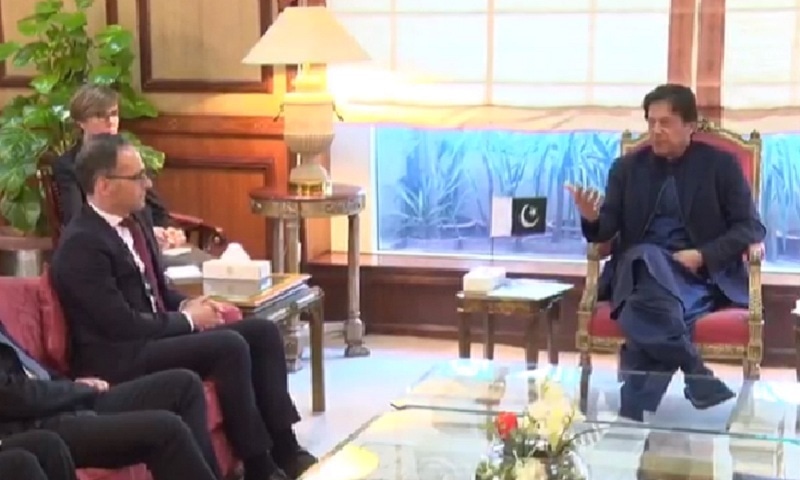Prime Minister Imran Khan on Tuesday apprised German Foreign Minister Heiko Maas on post-Pulwama regional situation, and urged the international community to take notice of the grave human rights violations in Indian-occupied Kashmir (IoK).
The Prime Minister welcomed Maas at his office in Islamabad, and told him that Pakistan attaches high importance to its relations with Germany, which are characterized by shared democratic values and multifaceted cooperation.
He praised the leadership of German Chancellor Angela Merkel, particularly her handling of the immigration crisis, according to a press release issued by the PM's office.
The Prime Minister briefed the German foreign minister on Pakistan's relations with Afghanistan and India as well as steps taken by his government towards de-escalation with latter.
The German foreign minister welcomed Pakistan’s efforts towards peace and stability in the region. He appreciated Prime Minister Khan’s responsible handling of the situation, particularly the decision of releasing Indian pilot Wing Commander Abhinandan Varthaman. He also underscored Pakistan’s key role towards achieving a peaceful settlement in Afghanistan.
On the bilateral front, the premier welcomed Germany’s investment in hydroelectric power generation and automobile sectors of Pakistan. Terming Germany as an important development partner, the prime minister invited enhanced German technical support for Pakistan in sectors related to human development, especially education and health.
Furthermore, Maas reiterated the German chancellor’s invitation to Prime Minister Khan to visit Germany.
'NAP is being implemented in letter and spirit,' Qureshi tells German counterpart
Earlier in the day, Foreign Minister Shah Mahmood Qureshi highlighted the anti-terrorism measures taken by Pakistan in accordance with the National Action Plan (NAP) that was formulated following the "horrific" massacre in Army Public School (APS), Peshawar in 2014.
Qureshi was addressing a joint press conference with Maas, who is on an official visit to Pakistan. "Obviously, fighting terrorism is a global challenge, a regional challenge and Pakistan has taken a lot of steps in that direction," he said. "I shared with the [German] foreign minister the evolution of the National Action Plan. The horrific, tragic incident of the Army Public School in Peshawar was a watershed [moment] in our thinking."
He said that the APS tragedy had "encouraged" the political leadership to reach a consensus over fighting terrorism. Qureshi added that the Pakistan Tehreek-i-Insaf government was ensuring that NAP is followed in "letter and spirit".
The foreign minister said that he had also directed Maas' attention towards the "very delicate situation" in Indian-occupied Kashmir that needed to be "addressed immediately".
"If there are human rights violations [in held Kashmir], if there are atrocities, then there will be a reaction and that reaction, at times, is difficult to contain," he said, reiterating Pakistan's stance that "dialogue was the only way forward".
"Pakistan has never been shy of dialogue," he declared and added that voices within India were also insisting that Kashmiri leadership and people should be engaged.
Maas lauded Pakistan's role in the ongoing Afghan peace process. He also appreciated Pakistan's "quick release" of Indian pilot Abhinandan and said the move had helped deescalate tensions between the two countries. In response to a question, he said that the German government acknowledged Pakistan's efforts towards deescalation. He further said that he had a meeting with the Indian foreign minister as well where he had stressed the need for a peaceful solution to the Kashmir dispute.
Qureshi also said that three German political foundations, that had "not been able to work in Pakistan" earlier, would now be able to launch operate in the country as both sides had "amicably" resolved the issues due to which the operations of the organisations were being hindered.
Maas and Qureshi also expressed satisfaction with the progress of the Afghan peace process and hoped that Kabul government would also be included in the talks that are being held between United States and Afghan Taliban. For now, Qureshi said, the talks were moving in a "positive direction".
Both foreign ministers also underlined the importance of trade relations between the countries and Qureshi announced that Volkswagen and Siemens had shown interest in investing in Pakistan.
The German foreign minister also met with Prime Minister Imran Khan.
Regional stability, peace
Earlier, in a meeting with Maas, Qureshi once again stressed the importance of regional stability and peace, Radio Pakistan reported.
Maas, who is on an official visit to Pakistan along with a German delegation, met Qureshi in Islamabad. The two discussed bilateral relations between Germany and Pakistan and regional security situation. The ongoing peace process in Afghanistan also came under discussion. Maas lauded Pakistan's efforts to arrange talks between the United States and Afghan Taliban so the parties could find a solution to a 17-year-old conflict.
Qureshi briefed Maas about the tense relations with India in the wake of the Pulwama attack last month. He pointed out that despite India's aggression, Islamabad had released the Indian Air Force pilot Abhinandan two days after he was captured by the Pakistan Air Force.
The German foreign minister urged Islamabad and New Delhi to solve disputes through dialogue.
India and Pakistan's relations reached their lowest point in decades following a suicide attack in occupied Kashmir's district Pulwama, in which 40 Indian soldiers were killed. The attack, carried out by a Kashmiri youth, was allegedly claimed by Jaish-e-Muhammad (JeM).
India blamed Pakistan for the attack. Pakistan denied the accusations but Prime Minister Imran Khan offered to investigate if provided "actionable evidence" by India.
Matters worsened after an Indian jet violated Pakistan's airspace on Feb 26. New Delhi claimed to have struck a terrorist camp; however, the Inter-Services Public Relations said that the Indian jet had dropped its payload "in haste" in a forest in Balakot after it was chased away by a Pakistan Air Force (PAF) aircraft.
A day later, PAF struck non-military targets across the Line of Control and shot down two Indian jets that violated Pakistan's airspace again. One Indian pilot, Abhinandan, was captured but was released two days later as a "gesture of peace".
















































